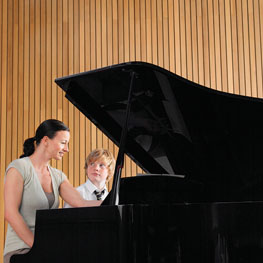
Does hearing the words, “Time to practice your piano lesson” strike a bad chord with your child? Does your sharp reminder to practice the violin or trombone fall flat because your child’s interest has started to fade?
Melissa Plamann, Ph.D., has been playing the piano for as long as she can remember. She began playing organ for church services when she was 12. She continued to study organ in college and completed a Master of Music degree at Emory University. By age 28, she had received her Doctor of Music degree and had performed internationally, giving concerts in Germany and the Czech Republic.
Even though Plamann is an accomplished musician, she admits that, like most kids, she didn’t always like to practice as a child. “My mom would set an egg timer on the piano and tell me I would be finished when it rang. So I always thought I could trick her by playing piano with one hand and advancing the timer with the other,” says Plamann.
Many young children start out excited to try an instrument or take music lessons, but that excitement can wane over time.
Dr. Plamann gives these suggestions for parents to stave off the inevitable slump students get into after the initial fun wears off:
1. Concert-ready. Arrange a special time each week when everyone is available for an informal performance. Occasionally invite other friends, family - even stuffed animals - and let your children choose whatever music they want to play. This makes them responsible for music preparation, encourages pride in their work and creates a positive performing environment. You may even want to have your children make (print, draw, color) a program for the ‘concert.’
2. Students become the teacher. Learn piano (or any instrument) along with your children. Make them teach you what they’ve learned that week, and struggle through the exercises with them. Giving them the responsibility of becoming the teacher encourages great learning, and showing them that you too have difficulty with the exercises is validating of their hard work.
3. Practice log and journal. Keep practice logs with stickers showing when/how long they practice. Also allow for space where they can write one or two words about how practice went that day. If you note a string of bad days, frustrations, etc., figure out what’s going on and talk to their teacher if it continues.
4. Musical rewards. Make rewards musical. Children should be exposed to lots of musical performances or styles. If they have a good practice week, rent a DVD of a professional pianist and watch it together. If they practice well for a whole month, let them dress up and accompany you to a symphony concert (matinee tickets can be inexpensive). Or, search for new piano music (movie tunes, Christmas songs, etc.) and make them work for it.
5. Advance to the next level. Re-evaluate your children’s teacher every year or at the beginning of each academic semester. One way to do this is to hire a teacher or graduate student from a local university for a lesson or two. Have them assess if your children’s books are appropriate, if they’re learning the right techniques and if they’re at the appropriate level. The number one problem in students not progressing is that they often stay with the same teacher for years and don’t move on when they’re actually ready to advance to another teacher.
Applying some of these methods to your children’s music routine can truly make practice fun for them. So the next time they hear, “Time to practice your lesson,” it will be music to their ears.
Deanne is a freelance writer and mom of three. She enjoys writing about the pleasures and perplexities of parenting, and is a frequent contributor to parenting publications. Find out more at www.deannehaines.com.
Calgary’s Child Magazine © 2024 Calgary’s Child